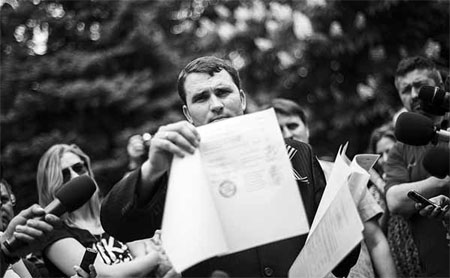Russia urges dialogue after Ukraine vote
Poll results show strong support for sovereignty of Donetsk, Luhansk
The Kremlin has urged the Ukrainian government to engage in talks with representatives of the eastern part of the country following controversial referendums in which about 90 percent of voters said they backed regional sovereignty.
The statement on Monday signaled that Russia has no immediate intention to annex the Donetsk and Luhansk provinces, like it did with Crimea following a similar referendum in March.
The cautious stance appears to reflect Russian President Vladimir Putin's hope of negotiating a solution to the crisis in Ukraine.
The Kremlin also urged the Organization for Security and Cooperation in Europe to help broker talks between the central government in Kiev and representatives of the east after Sunday's vote.
Ukraine's central government and the West have condemned the balloting as a sham and a violation of international law, and have accused Moscow of fomenting the unrest in a possible attempt to grab more land weeks after the annexation of Crimea - accusations that Russia has denied.
"The farce, which terrorists call the referendum, will have no legal consequences except the criminal responsibility for its organizers," Ukraine's acting President Oleksandr Turchynov said in a statement Monday.
Arriving in Brussels for a meeting with his EU counterparts on Monday, German Foreign Minister Frank-Walter Steinmeier told reporters that he considered the referendum "illegal".
"We cannot, and must not, take it seriously," he said.
The Kremlin, in turn, criticized the Ukrainian authorities for trying to thwart the balloting by using weapons against civilians. It pointed at a "high turnout" in the vote and voiced respect for its results.
Russian Foreign Minister Sergey Lavrov said that Moscow sees no need for another four-way meeting between Russia, the United States, the European Union and Ukraine following their talks in Geneva last month, saying that the Ukrainian authorities should now focus on dialogue with the east.
Unclear future
According to early returns, 89 percent of those who cast ballots Sunday in the Donetsk region and about 96 percent of those who turned out in the neighboring Luhansk region voted for sovereignty. It remained unclear whether the vote could lead to their secession.
The pro-Russian insurgents, who organized Sunday's balloting, said the ultimate status of the regions would be discussed later and could include the possibility of secession or annexation by Russia or remaining part of Ukraine.
Election organizers said turnout topped 70 percent by late afternoon, but with no international election monitors in place, it was all but impossible to confirm such claims.
Turnout was brisk at some polling stations visited by AP journalists. At one polling station at a school in Donetsk, all voting slips that could be seen in the transparent ballot boxes showed that self-rule had been selected.
Most opponents of sovereignty appeared likely to stay away from the polls rather than risk attracting attention. Surveys by polling companies have indicated that a significant majority of people in Ukraine as a whole reject movements to break away parts of the country.
There were no immediate signs of any outright intimidation by pro-Russian forces Sunday, and insurgents near the polls were not wearing their usual balaclavas.
A few days before the vote, Putin had urged the organizers to postpone the balloting in an apparent attempt to distance himself from the insurgents and keep his hands free for bargaining with the West.
His spokesman, Dmitry Peskov, was quoted by the Kommersant daily on Monday as saying that it was difficult for people in the east to heed Putin's call because of fighting in the region.
The insurgents in the east have seized government buildings and clashed with government troops and police over the past month. More than 30 people have been reported killed since Ukrainian forces began trying to retake some eastern cities from the insurgents.
|
The chairman of the Central Election Commission Alexander Malykhin shows a document with the results of the referendum outside the regional state administration building in the eastern Ukrainian city of Luhansk on Monday. Dimitar Dilkoff / Agence France-Presse |
(China Daily 05/13/2014 page11)









